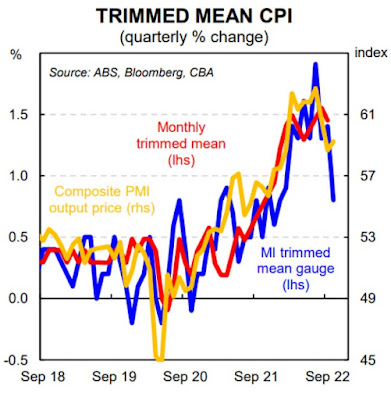Pause considered
CBA's Gareth Aird with the note today, predicting that the tightening cycle is done, with rate cuts to follow later next year, taking the cash rate target back down to below 3 per cent.
The Reserve Bank Minutes for December show that an interest rate pause was considered for the first time in this cycle, given that there will be an especially long lag between interest rate changes and transmission (due to the huge surge in fixed rate mortgages over the past two years).
Monthly inflation fell short of expectations last time around and the MI inflation gauge is already plummeting, even before the latest rate hikes begin to have an impact, and supply chain disruptions are being repaired all the while.
Unlike in Europe, the Reserve Bank of Australia didn't wait until inflation was at nosebleed levels before beginning to hike interest rates. Accordingly, inflation will on the way back down in 2023.
With 300 basis points of tightening already having been delivered, there is a strong case for a pause now to see how much the economy softens over the next few months.
With economists already forecasting a per capita recession in 2023, there should be little need for further tightening from here.
Westpac forecasts GDP growth of just 1 per cent next year, with zero growth in the second half of the year.
The Australia Institute notes that the average annual wage rise from enterprise agreements lodged since 15 July has been just 2.8 per cent, underscoring how there remains no risk of a wage price spiral in Australia.
Source: Australia Institute
Indeed, Australia is now embarking upon it's largest immigration program in its history, so wages growth is likely to become sluggish again in 2023.
The latest Cordell Construction Report showed a sharp decline in both new projects and the pipeline of work to be completed, confirming that the economy is already in the grip of a slowdown.





